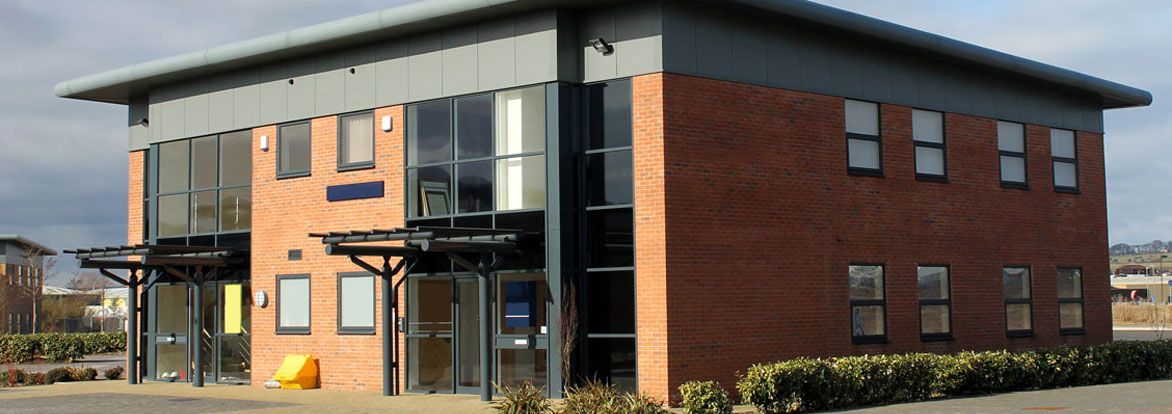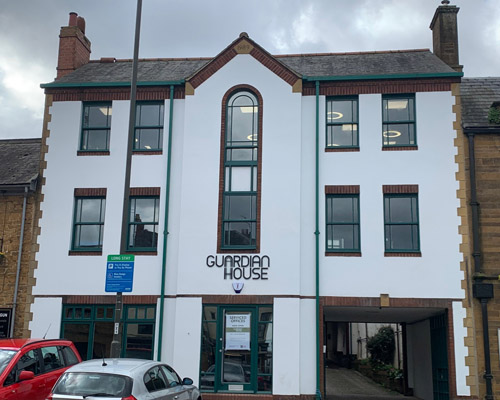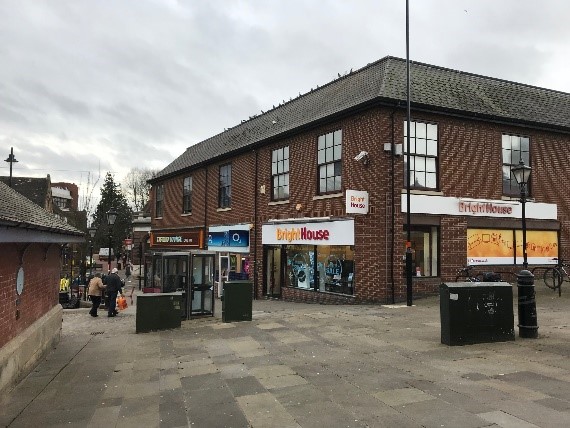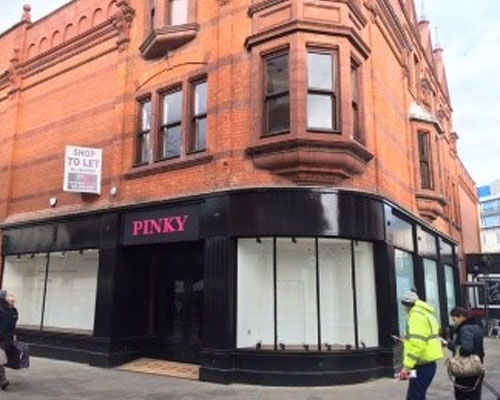
Neil Wild keeps an eye on property related news and shares his views on issues affecting property, real estate and the communities in which we work.
Former Banbury Guardian offices given new lease of life
Brand new offices are coming to Banbury to provide a high-spec space for start-up and growing businesses.

Brand new offices are coming to Banbury to provide a high-spec space for start-up and growing businesses. The offices which are well known to Banbury residents as the former Banbury Guardian building will be fully refurbished in the next few months and made available as high class office suites for companies of between 1 and 32 employees. The building has been re-named as Guardian House in recognition of the Banbury Guardian’s former long-term use of the building.
Point of Difference Workspace, a provider of quality offices and co working spaces in Bicester and Aylesbury has just signed the lease on the offices on North Bar. Andy Bedwell, Managing Director says “We love bringing life back to buildings and incorporating their heritage in the design. This is a fantastic site in a great location so we’re really looking forward to building a new business community here”.
The refurbishment will incorporate print-themed wall coverings and historic photographs in recognition of the buildings’ heritage. Alongside this, clients will also be able to incorporate their own designs and layouts which can be developed as part of the refurbishment plan for anyone who signs up early.
Neil Wild of Wild Property Consultancy, agent for the premises says “the building works really well for providing offices to a range of different businesses and given the shortage of available offices in the town we believe the space will generate a significant interest from Banbury’s businesses and entrepreneurs”.
Those interested in taking a desk space or offices at Guardian House can email
Budget Relief to the High Street?
Philip Hammond has brought a little welcome relief to the High Street with reductions in business rates and a fighting fund available for town centres. I shall consider the consultation on change of use permitted development rights another day.

We will get to see the detailed provisions for the business rates soon but suggestions are the one third reduction for properties with a RV up to £51,000 will apply for two years (April 2019-21). A one third reduction would be a significant sum, for example one of my clients’ property investments in Wellingborough town centre will see the retailer’s annual rates costs reduce by approx £7,000.
A typical property set to save one third from the business rates relief. This is one of my client’s investments in Wellingborough.
Pending site of the detailed provisions I’m thinking if Mr Hammond had rung me for advice leading up to his budget I would have advised he used the money to help rate payers in a different way. Remove the downward transitional phasing rules. The principle of business rates does work in the sense that those properties in locations with rising values will pay more than those in falling locations, provided regular re-valuations occur. However transitional phasing means a reduced RV following a re-valuation won’t provide the same percentage reduction in annual rates payable. I have written about this unfortunate outcome earlier (Businesses Not Getting Their Fair Share, November 2017). It is incredibly frustrating, impeding the full reduction a business in a struggling area is entitled but unfortunately not one many are familiar with; clearly too much detail for the daily papers to get into!
Mr Hammond’s other hand out, the fighting fund sounds appealing. I can imagine a Council with a well thought thorough plan for its town centre will know immediately how to effectively utilise any available money. Those without such a practical plan will struggle and no doubt will lose out during a competitive bidding process. This will encourage public and private sector collaboration which I’m keen to support.
In the Right Place for Growth?
We know location matters when making an investment decision. Whether it’s a site for a new factory, head office or the purchase of an income producing property investment. I believe I have developed good experience as an advisor to clients on this subject. One does need not only to consider existing factors that bring benefits to a particular location but also to take account of anticipated changes. One such change I have been keeping an eye on is the Government’s proposal for the Oxford to Cambridge arc.
The route of the proposed Express Way (Oxford to Milton Keynes section) has just been narrowed down and it is well worth spending time to appreciate the proposals for the arc now known as CaMKOx (pronounced Camkox). Oxford, Milton Keynes and Cambridge are already considered top places for investment but have the intermediate towns been identified? Some of these towns are very unfashionable destinations compared to the University cities at each end of the arc. The likes of Aylesbury, Bedford, Bicester, Bletchley, Leighton Buzzard and Winslow are poised to see significant population and business growth if the Government’s ambition of creating conditions for one million new homes across the arc is realised. These ambitions will need the construction of new settlements as well probably on fields somewhere between Bicester, Aylesbury and Leighton Buzzard I would anticipate. Locally with my base in North Oxfordshire I am aware the County will be taking its share of new homes over the next 30 years. Housing and business space development takes time to be planned and built but via my work with the local Chamber of Commerce I am calling for all the required infrastructure to be in place to support it all (not simply a new road).
The full report from 2017 is available at https://www.nic.org.uk/wp-content/uploads/Partnering-for-Prosperty.pdf
The route of the proposed Express Way (Oxford to Milton Keynes section) has just been narrowed down to one from Abingdon to south Milton Keynes via Winslow. The outstanding question for consultation is whether this passes to the south east or to the west of Oxford. This decision will be made in 2019. See the map
High Streets Matter
"Our high streets and town centres have an important social, civic and cultural place in our society… but what do we want them to look like in 2030 and what actions do we need from local and central government to ensure their longevity?" Clive Betts MP.
So begins the preamble to the Government inquiry which is due to examine the future role of the high street in contributing to the local economy and the health, cohesion and cultural life of the local community and the challenges faced amid changing demographic, technological and other trends in recent decades. I welcome the inquiry for the link that is being made at the outset between a vibrant town and not just the economic but also to the social fabric of a place and community. However unless the property profession and property owners thoroughly engage with such a conversation I tend to believe the recommendations will have limited impact. As a member of the RICS I shall play my part to help ensure colleagues do so. It’s encouraging to note that alongside the call for evidence, the Committee welcomes the views of the public on why their high-street matters and what they think could be improved about it. The public can tweet their views and pictures of their high street on #myhighstreetmatters to @CommonsHCLG
Businesses Not Getting Their Fair Share
Forgive me that most of my commentaries are on either business rates or pop up shops (short term lets as some prefer to call them) but in my town work I'm finding these two are recurring subjects. The latter as a proactive tool to build a pipeline of new or expanding independent retailers but the former as a recurring problem issue

I had naively believed that the business rates revaluation implemented in April would help solve some of the "high street" challenges and even help level the playing field for town businesses. No such luck!
So quick recap. Rateable Values hadn't been revised since 2008 due to Government postponement. Consequently the RV (which is an assessment of rental value at a certain date) got out of kilter with real values. This may have been good for some commercial property occupiers where rents had increased and the RV hadn't but on properties where rents had dropped since 2008 it was bad news and frankly unfair.
In two of the towns I work in we'd been looking forward to the revaluations and were rewarded with some helpful RV reductions of up to 40%. Good news one would think - a much reduced rates bill from this April!
Sadly not. It's taken me a while to accept the significance of the words "Transitional Phasing" which trip off the lips of many a business rates council Officer.
Helpful for improving areas where RVs have increased, giving the business time to adapt, the five year transitional phasing for the full impact of the increase to kick in seems helpful and generous.
But for those who have for the past few years been paying rates based on an outdated RV well above current rent levels, for the phasing to limit the reduction to just 10% [1] is incredibly harsh.
Regent Street, Swindon where typical RV’s have dropped by 40%
New Rateable Values Announced
You will need to input your post code and the website shows Current RV and Draft 2017 RV. This is first time for some years the RVs have been re-valued nationally and will mean changes since the last valuation in 2008 will be reflected.
This is the ink for the draft 2017 Rateable Values. https://www.tax.service.gov.uk/view-my-valuation/search
It seems that without exception town centre shops in Banbury will benefit from reductions. For instance the former Stead and Simpson shoe shop at 4 High Street will see its RV reduce by 30% which is typical of reductions on the High Street.
Of course if you are on Small Business Relief then these changes will have less significant impact but if you are not then there are potentially savings to be experienced from April next year. Be aware that Transitional Relief applies which means the full benefit of the reduced RV will not come through on bills immediately - i.e the reductions will be phased in over a period of years. This is to offset the Transitional Relief for those experiencing an increase in rates payable in other parts of the country or on other types of property.
Those who have been waiting for reductions to take effect will no doubt feel rather aggrieved by the further irritant of the transitional rules.
As a separate matter, I have yet to see the full details of the changes to the Small Business Relief rules also due from April next year but the word on the high street is that qualifying businesses with an RV of £12,000 or less will pay NO rates from April 2017 and those with RV between £12,001 and £15,000 will see tapered relief. (These are improved benefits from the current scheme). Good news all round. Let’s hope when the rules are announced that the Government makes them a permanent arrangement rather than their current habit of confirming the rules for the next 12 months only.
Neil Wild speaker at Oxfordshire High Streets Conference
In July Flashop UK Ltd and People & Places hosted the Oxfordshire High Streets Conference. It took place for a day in the growing town of Bicester. A topical location with its town centre scheme having been open now for three years. Neil took the floor to discuss "Filling the empties" which was a discussion of why the property market for town centres is broken and how with his colleagues he has been able to take action to overcome the barriers, getting the shop units occupied. Click to see a summary of his discussion.
This is the ink for the draft 2017 Rateable Values. https://www.tax.service.gov.uk/view-my-valuation/search
It seems that without exception town centre shops in Banbury will benefit from reductions. For instance the former Stead and Simpson shoe shop at 4 High Street will see its RV reduce by 30% which is typical of reductions on the High Street.
Of course if you are on Small Business Relief then these changes will have less significant impact but if you are not then there are potentially savings to be experienced from April next year. Be aware that Transitional Relief applies which means the full benefit of the reduced RV will not come through on bills immediately - i.e the reductions will be phased in over a period of years. This is to offset the Transitional Relief for those experiencing an increase in rates payable in other parts of the country or on other types of property.
Those who have been waiting for reductions to take effect will no doubt feel rather aggrieved by the further irritant of the transitional rules.
As a separate matter, I have yet to see the full details of the changes to the Small Business Relief rules also due from April next year but the word on the high street is that qualifying businesses with an RV of £12,000 or less will pay NO rates from April 2017 and those with RV between £12,001 and £15,000 will see tapered relief. (These are improved benefits from the current scheme). Good news all round. Let’s hope when the rules are announced that the Government makes them a permanent arrangement rather than their current habit of confirming the rules for the next 12 months only.
Neil Wild facilitates re-use of two Banbury town centre shops for pop up art exhibition and workshops.
Each of the last three years the Banbury and Bicester College, part of Activate Learning, hold their end of year student shows in the town centre. Neil and his town team colleague Iain Nicholson have been keen to help source town centre shops and are delighted this year to have found two willing landlords to allow such a use. This year agreement has been reached for use over seven weeks in May and June for the College to both host exhibitions but also run workshops for kids and adults. The project kicked off when Carol Wild, art educator at Birmingham City University, and of course Neil’s wife, ran a day’s workshop entitled Build A City, coinciding with the Old Town Party.
The use of the shops in this way is a really positive initiative. It’s disappointing when some landlords or their agents cannot see the benefit. Through a simple Licence Agreement the arrangements are documented, the property is put in use and there are of course much wider benefits to the community to experience a vibrant shop use rather than a closed front door or worse metal shutters. Often the temporary use turns into a much longer term occupancy.
Louise Williams, one of the course leaders at the College now sees this annual festival as an integral feature of the town’s creative and cultural calendar giving students the opportunity to develop skills in organising a public exhibition and understanding the commercial realities of the creative industries.
The shops are 36a Church Lane and 38 Parsons Street Banbury. With thanks to Urban Spectrum Property Management for their assistance.
Follow the link for photos and local press coverage.
Here Neil suggests reform is required in the Business Rates rules for Listed Buildings.
Business rates is a complex area. Start explaining it to someone and you can see their eyes glaze over! Business rates frequently crops up with my work on town centre retail property so I've developed something of an understanding.

Three quick facts:
- Business Rates is a tax on business property (usually payable by the occupier) levied by the Council but with the rules set by central Government
- Vacant property is usually subject to the tax (and in such circumstances is usually paid by the owner)
- Vacant Listed Buildings (due to historic or architectural merit) are not subject to the tax.
This piece is about the Business Rates relief that Listed Buildings enjoy. Below is a selection of empty shops in Banbury, as examples.
They are all Grade 2 Listed with such a status rightly to protect their historical and/or architectural merits.
But empty Listed Buildings are a particular challenge for town teams...
One of the reasons for this is the generous Business Rates advantage granted to the owners of Listed Buildings. Vacant Listed Buildings attract a full and permanent business rate exemption. This is in contrast to non listed buildings where business rates is payable (for shops after three months) when vacant. These rules are set centrally. The advantage potentially gives owners additional funds to invest in maintenance and repair.
The payment of Business Rates is an incentive on property owners to encourage occupancy as the charge will be transferred from the owner onto the occupier. This encouragement is lost on vacant Listed Buildings.
My colleagues and I have great success working with landlords of vacant shops to identify viable retail occupiers for the benefit of the town. The owners pass on the Business Rate charge to the occupier who in return enjoys use of the building. This incentive is lost where the vacant property is Listed as there is no rates payable.
Each of the examples shows a vacant Listed retail property. Unfortunately vacancy often leads to a lack of maintenance creating a deterioration of the property we want to preserve. I see very few examples of owners using the tax relief to the benefit of the property.
My colleagues and I keep a record of the occupancy levels in Banbury town centre. Based on my research reoccupation of the current vacant Listed Buildings in Banbury town centre ) which includes offices and shops) alone would add over £350,000 per year to the revenue of Cherwell District Council. That revenue is currently lost as there is no scheme to claim it back.
This leads me to conclude it's in each Council’s interest to work hard to encourage occupancy even to a charitable user (as the charitable relief can be re-claimed by the Council).
This benefit undermines the protection of the Listed Buildings, as vacant properties quickly deteriorate. My suggestion is that Government change the rules so all Grade 2 Listed Buildings lose this business rate exemption.
Pop up shops working to help the property market in Wallingford
Neil is continuing his work in Wallingford (South Oxon) to encourage new business and add diversity to the town's retail provision.
Business group calls for business rates reform to be 'top priority' at 2016 Budget
The Confederation of British Industry (CBI) has urged the Government to reform the current business rates system, amid concerns that it is 'outdated' and 'undermines' both retailers and manufacturers.
In a new briefing released ahead of the Chancellor's Budget, the CBI warns that the existing model is unable to cater for any changes in the UK's economic circumstances. The lobby group also claims that the existing business rates system is increasing taxes for UK firms.
According to the CBI, over the last seven years the rate of tax revenue growth from business rates has risen by 28%, far exceeding other types of tax and growing at a quicker rate than the Government's overall tax take. With the Government due to report back on its business rates review in March, the CBI has set out its recommendations for a 'simpler, fairer and more competitive' system. It argues that business rates could be made simpler by removing firms with a 'rateable' property value of less than £12,000 from the system completely, while carrying out more regular valuations would help to make the system fairer.
In addition, the CBI suggests that moving from RPI to CPI indexation for annual increases will result in 'a more stable business rates multiplier'. Commenting on the organisation's proposal, CBI Economics Director, Rain Newton-Smith, stated: 'The current business rates system is from another era and proving an ever-increasing problem for firms, hitting our high streets and manufacturers across the country. And devolving business rates does not tackle the significant problems that this distortive tax is causing for businesses. 'The Government cannot put business rates reform off forever and we want to see urgent action taken at the Budget. Business wants to see the smallest firms completely removed from the system, more frequent valuations and ensure the system is tied to the Consumer Price Index to make it fairer and more competitive.'
In the 2015 Autumn Statement, the Chancellor revealed plans to allow local government to keep the rates they collect from business, and to give councils the power to cut business rates to boost growth. Osborne also outlined proposals to give elected city-wide mayors the power to levy a business rates premium for local infrastructure projects, provided they have the support of the local business community. Furthermore, in its Budget 2016 submission the CBI revealed that new measures such as the National Living Wage and the Apprenticeship Levy could potentially result in a £9 billion-a-year burden for businesses by the year 2020. The group is calling on the Chancellor not to further increase the 'cumulative burden' and to support investment and innovation by increasing the scope of capital allowances and broadening access to research and development.
The Chancellor will present the 2016 Budget on Wednesday 16 March.
Services
Commercial Property
Chartered Surveyors
Asset Management
Investment
Examples of Recent Work
